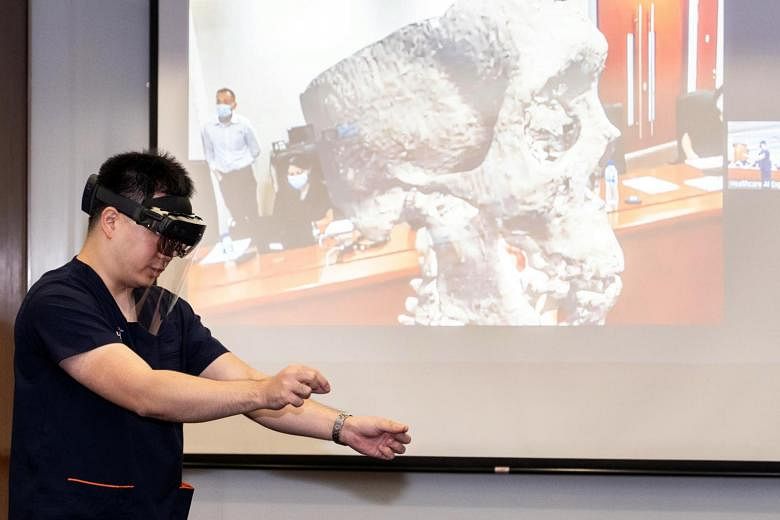SINGAPORE - From a computer model that predicts how likely patients are to fall over to a device that creates 3D holograms to assist doctors, the healthcare of the future is looking towards artificial intelligence (AI).
These new developments were showcased last Friday (Dec 11) by the National University Health System (NUHS) at the Singapore Healthcare AI Expo.
"There is a digital transformation coming to the whole of society," said Professor Yeoh Khay Guan, chief executive of NUHS. "Healthcare systems are transforming worldwide and we must be ready for that."
Increasing efficiency is a goal of Dr Siti Zubaidah Mordiffii and her team.
The assistant director of nursing at the National University Hospital (NUH) is working with collaborators to create an AI-enabled model that can analyse a multitude of data and produce a faster, more comprehensive and more accurate prediction for fall risks for patients in wards.
Assessing such risks is critical in preventing falls and fall-related injuries for hospital patients. Nurses perform evaluations daily, but there is only so much they can do.
"It is unimaginable to take into consideration all the factors that we need," said Dr Siti. "Too many, and the nurses will get very confused and fatigued."
Meanwhile, another arena being explored is the use of mixed reality (MR) in healthcare.
For the past year, NUHS has been working with Microsoft and German company apoQlar on using 3D holographic imaging for medical purposes.
Their aim is to synthesise many forms of data, such as from magnetic resonance imaging and CT scans, into a fully interactive 3D hologram, for example, of a patient's skull or tissues.
This can be overlaid on the real world using HoloLens2, a MR device produced by Microsoft. It opens up different ways of improving healthcare, such as by increasing patient safety and operating efficiency.
"It offers the opportunity for us to streamline everything we do," explained Dr Gao Yujia, programme lead of NUHS HoloMedicine. "Even on a trial basis... It is something that has endless possibilities."
Professor Ngiam Kee Yuan, group chief technology officer at NUHS, said: "We designed this in a programmatic approach because we see more than one use for this... such as in administration and education."
Prof Ngiam also leads a team of NUHS researchers as the only representatives for Singapore and Asia in 4CE, an international consortium studying the effects and epidemiology of Covid-19.
AI is also having an impact on cancer treatment. For over two years, NUHS has been working with China-based Ping An Health Technology on a clinical decision platform for managing gastroesophageal cancers.
Currently, the "gold standard" for cancer treatments is having a multidisciplinary team (MDT) with various specialists who discuss patient cases and decide on a treatment plan, said Professor Jimmy So, head of surgical oncology at the National University Cancer Institute.
"As you can see, this process is quite labour-intensive and resource-heavy," Prof So added. "Unfortunately, this type of MDT is also not available for many smaller hospitals or clinics."
With the new platform, the first of its kind in Singapore, oncologists can enter a patient's information and receive updated treatment recommendations.
These will be based on evidence from the latest medical research, which will hopefully help health professionals strapped for time.

